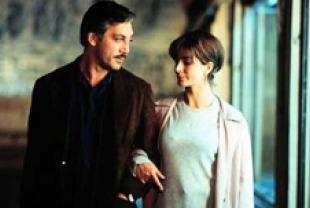This is a sophisticated and subtle political thriller set in an unspecified Latin American country. The nuanced screenplay by Nicholas Shakespeare is based on his own novel. The events were inspired by the terrorist activities of the Shining Path guerrilla movement in the early 1990s. John Malkovich makes a fine directorial debut with a drama that is compelling and well acted. It begins and ends with a monologue and song ("Who Knows Where the Time Goes") by the legendary Nina Simone. This deft artistic device works well and speaks volumes about Malkovich's sensitivity to the ways in which violence and love thicken over time.
Augustin Rejas (Javier Bardem) is a lieutenant in the police force who started out as a lawyer but ended up as a cop "because I'm trying to find a more honest way of practicing the law." He has no respect for the current president of the country and is scornful of the large role played by the military in this administration. While Augustin is satisfied with his modest life, his wife wants to have a nose job and yearns to be more glamorous. He is quite close to his daughter, who is a talented dancer.
The city becomes a stage for the guerilla activities of a mysterious group who oppose the present regime. They begin their campaign of terror by stringing dead dogs with sticks of dynamite in their throats from the lampposts. When the wealthier citizens of the city attend an avant-garde theatrical performance, members of the audience are taken to the stage and then assassinated in the dark. One of them is the Minister of the Interior.
Augustin's wry superior (Oliver Cotton) puts him in charge of the investigation to find out who a terrorist called Ezequiel (Abel Folk) is and who is behind this movement. The quiet and intense policeman travels to the countryside and learns from the poor people that this violent man has already become a legend. "He's in every tick of the clock," says a peasant. "He's every sun which refuses to set," says another. Augustin's family lost its coffee farm years ago and during a visit with an old friend, he discovers that Ezequiel's Maoist revolutionary tactics have broad support.
Back in the city, a group of teenage girls succeed in stopping a limousine with a lecherous admiral inside. When the window opens, the girls pull out their guns and kill him. Augustin finds one of the youthful assassins lying in her bed dying of a bullet wound in her face. She defiantly flicks some blood off her chin onto his suit. Augustin realizes what difficulties lie ahead of him. The city is put under martial law.
One of the first things to vanish in a world of terrorism is the simple and informal trust between people. Any stranger might be an enemy so everyone is on guard. This development is vividly conveyed in Augustin's relationship with Yolande (Laura Morante), his daughter's dance teacher. In a series of random encounters, they draw close to each other. He is taken with her natural beauty and her commitment to the artistic life. Later when his investigation discovers the identity of Ezequiel and his location in the city, Augustin fears Yolande's involvement with this cerebral and charismatic revolutionary who has so many women and children willing to lay down their lives for his cause.
